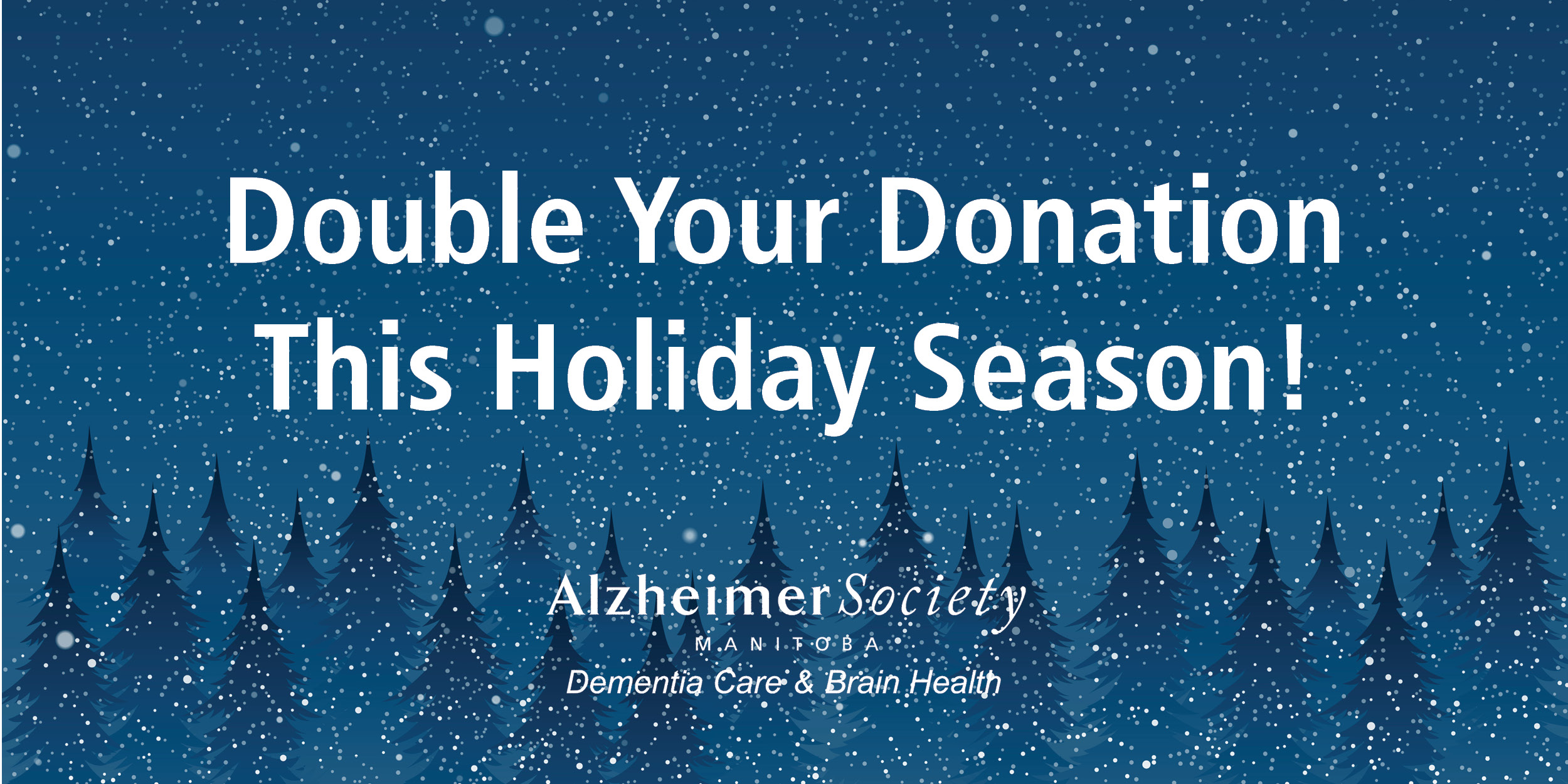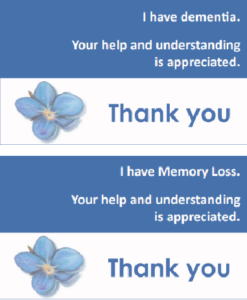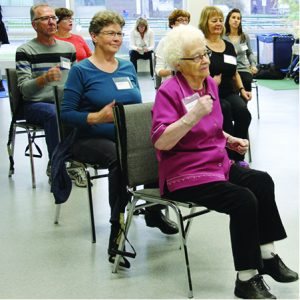Double the Donation, Double the Impact
Navigating the Holidays
Dementia-Friendly Video Series
Managing Care Partner Stress Around the Holidays
Ph.D. Student Receives Research Funding
What is Young Onset Dementia?
2023 Winter Education Calendar is Now Available!
Upcoming Winter Community Programs
Dementia Care Series – Register Today!
Join a Support Group!
Double the Donation, Double the Impact

Your donation will double when you give to the Alzheimer Society this holiday season thanks to four generous donors!
Your gift will help families like Marcel and Ida’s receive the support they need for every step in their dementia journey. Watch the following video to learn more about Ida’s diagnosis of frontotemporal dementia at just 55 years old and how they found support through the Alzheimer Society.
With the rising numbers of those living with dementia in Manitoba, your support is more important than ever before. Your donation will go even further this holiday season thanks to our wonderful matching donors, David Greenwood, Neil Carlson, Elden Wittmier and one anonymous individual.
Please consider a gift and double your impact today – that means $10 turns into $20, $100 turns into $200, and $500 turns into $1000!
Click here to make a donation today!
Navigating the Holidays

The holidays can be a challenging time of year, filled with feelings of joy and sadness, and often causing mixed emotions for families living with dementia. While typically a time for celebration, traditions and gatherings, the holidays can also be a time when families may experience a sense of loss for the way things once were.
Changes in ability do not alter a person living with dementia’s importance in the family or their need to be included. By considering new ways of thinking about the holidays and modifying traditions, families can find meaningful ways to celebrate and create memories while accepting the range of feelings and emotions that may arise.
Here are some things to consider when navigating the holidays, with special advice from Emily Kinnaird, Education Coordinator at the Alzheimer Society.
Place and setting
- Choose familiar places for your gatherings to help avoid confusion
- Reduce external stimulation as much as possible (turn down the TV or music to make sure the volume isn’t overwhelming)
- Turn blinking lights to a still mode or off completely
- Celebrate only the occasions and traditions that are most important to your family
“Changes in a physical space, like the addition of a Christmas tree and decorations, can be disorientating for someone living with dementia,” says Emily. “It’s important to adjust your space as it’s needed.”
Timing and scale
- Plan your gathering in the morning or afternoon if the person living with dementia typically goes to bed early
- Keep celebrations short. For longer gatherings, consider only attending the most meaningful part
- Plan for smaller, more personal interactions rather than large gatherings to minimize stress and feelings of being overwhelmed
- Establish a quiet area at your gathering where the person living with dementia can retreat and have someone keep them company when needed
- Plan festivities on a day and at a time that best suits the person or people living with dementia
Emily says the best way to include someone living with dementia in festive plans is to prioritize their needs.
Participation
- Do calming activities with the person living with dementia to help reduce overstimulation. Baking, looking through old photos or wrapping gifts are a few activities you can try
- Involve the person living with dementia in preparations and decision-making, especially with tasks they can still do or enjoy
- Bring gifts and items that have meaning to the person living with dementia
- Take your time and don’t rush through activities or visits
- Be open to talking about past events and memories of similar occasions that the person living with dementia may remember
“When my family got together for the holidays, we would try to focus on the needs of our family members living with dementia and the time we spent together,” Emily says. “We’d live in the moment and meet them where they were at.”
Click here to learn more about best practices when visiting someone living with dementia over the holidays.
You are not alone this holiday season. For more information or support, connect with us by calling 204-943-6622 (Winnipeg) or 1-800-378-6699 (toll-free in Manitoba) or emailing [email protected].
Dementia-Friendly Video Series: Reducing Distractions

The Alzheimer Society and Dementia-Friendly Canada recently released four new videos showing ways we can be dementia-friendly in the community. We’re kicking off this series with the first video: Ways you can be dementia friendly: reducing distractions.
Restaurants are places we often go to socialize with family and friends and celebrate special moments with those closest to us. For someone living with dementia, restaurants can also be an overwhelming environment. By learning a few dementia-friendly tips, we can ensure everyone continues enjoying these community spaces.
Reducing distractions is something we can do to help make an environment more comfortable for a person living with dementia.
In the video, the server notices the volume inside the restaurant is overwhelming. To help the person living with dementia and their care partner feel more at ease, the server:
- Offers to move the pair to a table in a quieter section
- Turns down the music
- Speaks slowly and clearly
- Asks them one question at a time and allows them time to respond
 These small efforts will not only help the person living with dementia focus on their meal and enjoy socializing but will also help the server listen to and meet their guest’s needs.
These small efforts will not only help the person living with dementia focus on their meal and enjoy socializing but will also help the server listen to and meet their guest’s needs.
If a server is unaware of the situation, Memory Cards can help people living with dementia and care partners communicate their needs. It can be difficult to explain your unique situation to those who are unfamiliar with dementia. To ease this challenge, you can print these cards to carry with you. Show this card to others, letting them know that you, or the person you’re with, have memory loss or dementia and that their understanding is appreciated. Find out more about Memory Cards and download them here.
Care partners can also act on the above tips to help meet the needs of a person living with dementia. For example, they can ask a server to move to a quieter section of the restaurant and lower the music. They can also speak slowly and clearly to the person living with dementia and give them time to make choices and respond.
Reducing distractions in your environment can help someone living with dementia and care partners feel valued, included and supported.
To learn more about how you can become dementia-friendly, visit Alzheimer.ca/DementiaFriendlyCanada.
Managing Care Partner Stress Around the Holidays

The holidays are here again, which can be a stressful time for many. If you are a care partner for someone living with dementia, navigating the holidays can be uniquely challenging (check out our Navigating the Holidays story above).
While it’s important to make sure a person living with dementia is as comfortable as possible during any holiday celebrations or traditions you may practice, it is equally important for care partners to meet their own needs. Tis’ the season for self-care!
It’s common to feel overwhelmed this holiday season, so here are a few tips to help relieve stress:
- Take care of yourself. Maintain a healthy lifestyle and get enough sleep
- Take several deep breaths throughout the day to refocus yourself when you are feeling particularly overwhelmed
- Use positive self-talk to give yourself a break from self-criticism. Speak to yourself like a kind and supportive friend would
- Recognize the important work you do and that your efforts are appreciated
- If you have extra family around during the holidays, ask someone to plan a visit with the person living with dementia at a time when you could take a relaxing walk or bath
- Ask for help when you need it and accept help that is offered
- Seek community support, connect with friends, neighbours or colleagues
- Join a support group (visit our Support Groups page for info on upcoming sessions)
- If stress is affecting your physical health, your relationships and your day-to-day functions – seek help. Call a crisis line, speak to a counsellor or your doctor as soon as possible
Remember – you are not alone. The Alzheimer Society is here to help you throughout your entire journey with dementia.
If you’d like more information or support, there is an upcoming Family Education session on care partner guilt and stress, which you can register for here.
You can also check out this brochure: Reducing caregiver stress.
Ph.D. Student Receives Funding for Dementia Prevention Research

Does the hormone estrogen have the potential to prevent dementia?
This is the question Ph.D. student Pranav Mishra hopes to answer through his latest research, supported by the Alzheimer Society of Manitoba’s Graduate Student Fellowship funding of $4,000.
Pranav Mishra loves being in an academic environment and working alongside other researchers passionate about learning and discovery. He is currently working on his Ph.D. in the department of Pharmacology and Therapeutics at the University of Manitoba, but neuroscience wasn’t always his academic focus.
Pranav’s love for animals inspired him to start studying Zoology in high school, and he later received a bachelor’s and master’s degree in Zoology from the University of Delhi. However, while Pranav was working on his master’s project in 2018, his father fractured his skull in an accident. The fracture caused a traumatic brain injury, which led to cognitive changes that affected his memory. This was an emotional time for Pranav and his family – his father began forgetting the people closest to him.
His father’s accident inspired Pranav to change the focus of his studies, and he jumped into neuroscience with a particular focus on memory.
“My father recovered from his injury and regained most of his memories,” Pranav says. “But his accident made me realize that for people living with dementia, losing memory is a very real and continuous challenge.”

He came to Canada in 2020 to begin his Ph.D., and his thesis explores estrogen’s effect on inflammation and energy metabolism in the brain. Estrogen plays an essential role in the formation of memories. Falling levels of estrogen can lead to an increase in inflammation and a decrease in energy metabolism in the brain, which are both consistent with dementia diagnoses. Pranav’s current experiments focus on using estrogen to raise energy levels in brain cells.
“One of the most valuable lessons I learned during my education is that the field of medicine is constantly evolving to account for new data and discoveries,” Pranav says. “These facts and my experiences so far have made me more curious toward finding a treatment for Alzheimer’s that is both affordable and effective.”
Pranav is thankful to his advisors, Dr. Albensi and Dr. Fernyhough, and his family and friends for their guidance and support. He is also grateful to the Alzheimer Society for the fellowship funding, which has been a driving force and motivation for his ongoing research.
Types of Dementia Series: What is Young Onset Dementia?

Dementia is an umbrella term used to describe a range of neurological conditions affecting the brain that get worse over time. The term refers to a loss of cognitive functioning – in thinking, remembering and reasoning – to the degree that interferes with a person’s daily life and everyday activities. In this series, we take a look at several different forms of dementia, with this installment covering young onset dementia.
When dementia symptoms begin before the age of 65, it’s referred to as “young onset dementia.” Many people assume that Alzheimer’s and other dementias only affect older adults; however, young onset dementia accounts for an estimated two to eight per cent of all dementia cases.
Right now, at least 28,000 Canadians under the age of 65 are living with young onset dementia. Most people with young onset dementia are in their 40s, 50s or early 60s.
What are the signs of young onset dementia?
There is no one kind of young onset dementia, and there is no “right way” to have, live with, or care for someone living with this type of dementia. Young onset dementia manifests in different ways for different people.
Some signs of young onset dementia can be:
- Changes in behaviour
- Shifts in the ability to do everyday work tasks
- Difficulty speaking or writing
- Challenges seeing, controlling muscles and balancing
If you think you or someone you know might be showing signs of young onset dementia, the Alzheimer Society Young Onset Personal Symptom Checklist can help you track symptoms and start a conversation with a doctor, nurse practitioner, or another healthcare provider. Click here to view the checklist.
Young onset dementia challenges
People who are diagnosed with young onset dementia may face unique challenges, such as:
- Working at the time of diagnosis
- Having dependent children/parents living at home
- Having significant financial commitments (mortgage, children, university fees, etc.)
- Being more aware of their symptoms
- Finding it hard to accept losing certain skills
- Finding it difficult to get information, support and services adapted to younger people with dementia
Young onset dementia is a diverse condition. Many different aspects can change how someone experiences young onset dementia. Contexts like your gender or sexuality, your job or income, or your language or ethnocultural community can all change how you or someone you care for experiences living with young onset dementia.
When you or someone you are caring for is impacted by young onset dementia, it can be helpful to speak to others who are in similar situations. Our support group for care partners of people living with young onset dementia is an inclusive, safe environment to find support. You can learn more about the support group here.
For more information on young onset dementia, or other types of dementia, contact the Alzheimer Society of Manitoba at 204-943-6622 or 1-800-378-6699 and ask to speak to a Client Support Coordinator or Regional Coordinator.
2023 Winter Education Calendar is Now Available!

The 2023 Winter Education Calendar is now available! Our winter sessions are offered both in-person and via Zoom and cover a variety of topics to help you on your dementia journey.
Click the links below to check out available seminars and to register!
Family Education Winter 2023 Calendar
Family Education – Alzheimer Society of Manitoba
Register Today for the Winter 2023 Community Programs!

You can now register for the following Winter 2023 community program dates!
Tales Along The Trail
Enjoy Manitoba’s winter outdoors! Warm mittens, crunchy snow, and crackling campfires set up calming, fun, natural adventure – all in city limits!
Tales Along the Trail is for people living with early to moderate symptoms of dementia and their care partners who are looking for a safe but exciting way to encounter the natural world.
An experienced naturalist will guide the group along FortWhyte’s gentle pathways, pointing out all winter has to offer and encouraging everyone to use all their senses to explore.
Each session will have a relaxing walk through the woods, with stops focusing on all of our senses. We then will have a chance to share thoughts, stories, and a snack around a crackling fire or cozy indoor space. In stormy weather, we bring nature indoors, keeping the engagement and fun going while we watch the wind and snow outside.
Winter Program (Wednesdays)
January 25 – March 8
$126/pair for all seven sessions
Registration open now. Please contact [email protected] for a link to register for this program.

Vivace Voices Choir
Come and join in making music together! Singing in a choir is a challenging and joyful experience. Learn to sing new and familiar music while making connections with those around you. No prior choral experience is required. Care partners must attend with persons living with dementia.
Winter Program (10 weeks)
Wednesdays, 6:30 – 7:30 pm, $145/pair
January 25 – April 5
Click here to learn more and to register!
Developed by the Community School of Music and the Arts at Canadian Mennonite University with assistance from the Alzheimer Society of Manitoba.
 Minds in Motion®
Minds in Motion®
Our popular Minds in Motion® program connects people living with early to moderate signs of dementia and their care partners through fitness, fun and friendship. Participants take part in a gentle chair fitness class followed by socially engaging activities and conversation.
There are lots of laughs and social interactions during these sessions. We are excited to offer both in-person and online options.
Dates, times and registration information are available for the Winter 2023 Minds in Motion sessions! Click here to learn more and to register.
Dementia Care Series – Register Today!
Essentials of Day-to-day Dementia Care – Sponsored by All Seniors Care

We invite you to our Dementia Care Professional Development Series! Sessions are geared towards health care staff and take place online monthly until March 2023.
Join our next session on Thursday, January 19 from 2 – 3 pm called Digging Deeper into Advance Care Planning featuring Andrew Saunderson and Laura Gaspard, Advance Care Planning Social Workers from Fraser Health, who will provide insight on advance care planning using real-life case scenarios and a review of the important steps in the planning process.
This professional development series, which started in April, is focusing on the foundation for successful and meaningful dementia care that will benefit the person living with dementia, their families and the healthcare system as a whole. For a $20 registration fee, you can watch all 3 remaining live presentations and get access to recordings of all 11 sessions!
Visit our website today for upcoming sessions, speaker bios and to register today!
Join a Support Group!
 Why not join one of our many virtual or in-person support group offerings this winter?
Why not join one of our many virtual or in-person support group offerings this winter?
Support groups provide participants with an opportunity to learn more about dementia and its progression, share feelings and common experiences, exchange practical coping strategies and mutual support, as well as participate in meaningful discussions.
These support groups are a confidential and safe place for care partners to share their experiences of caring for a person living with dementia or memory loss. We welcome everyone to this inclusive environment for people of different ethnicities, cultures or persons who identify as part of the 2SLGBTQ+ community.
Care Partner Support Groups
We’ve highlighted a few of our Care Partner Support Group offerings below, but for a complete listing of all virtual and in-person support groups, please visit our Support Groups page.
Men’s Coffee Talk Support Group
Meets in-person at the provincial office in Winnipeg on the fourth Thursday of the month from 10:00 to 11:30 am.
This support group is for male-identifying care partners to connect with one another and share information about their experience of caring for a person with Alzheimer’s or another dementia.
Spouses of People Living with Dementia in Personal Care Home
Meets in-person at the provincial office in Winnipeg on the second Wednesday of the month from 2:00 to 3:30 pm.
This support group offers spouses of people with dementia living in a personal care home the opportunity to meet and share information about their experience of caring for someone who has transitioned into long-term care. This caregiving experience presents unique challenges for care partners as they:
- navigate their role changes,
- adjust to changes in self-identify
- adjust to living separately from their spouse
- help to support a spouse in their dementia journey
Virtual Ambiguous Loss Support Group
The Ambiguous Loss Support Group assists care partners to work through the feelings of ambiguous loss and grief that are experienced when someone close to you has dementia. The goal is to help care partners build up enhanced coping strategies that will support you in your role as a caregiver, and to help you plan for the future.
For more information, or to add your name to the waitlist for the next available session, please contact:
Samantha Holland
Interlake-Eastern Regional Coordinator
204-268-4752
[email protected]
Support Groups for Persons with Dementia
Having a diagnosis of dementia can lead to a variety of thoughts, feelings, and emotions. Our support groups for people with dementia provide participants with an opportunity to:
- Learn about dementia and its progression,
- Share feelings and common experiences,
- Exchange practical coping strategies and mutual support,
- Participate in meaningful discussions.
For more information about current and upcoming support group opportunities, both virtually and in-person, please contact:
Sarah Dueck
Client Support Coordinator & Group Lead, Winnipeg/Provincial Office
204-943-6622 ext. 213
[email protected]
Additional Information
For more information about all support group offerings, including registration information, please contact the First Link Client Support team at 204-943-6622 or email us at [email protected].
Our new support groups were made possible by a multi-year commitment for our First Link® program from the Jessiman Foundation. A heartfelt thanks to the Jessiman family for this leadership gift that has allowed us to expand our programs in such a significant way.
Remember. You Are Not Alone.
We are here to help you and your family no matter where you are in your dementia journey. You can reach a comforting ear by phone or get a quick response by email. Call us at 204-943-6622 (Winnipeg), 1-800-378-6699 (toll free in Manitoba) or email [email protected]
